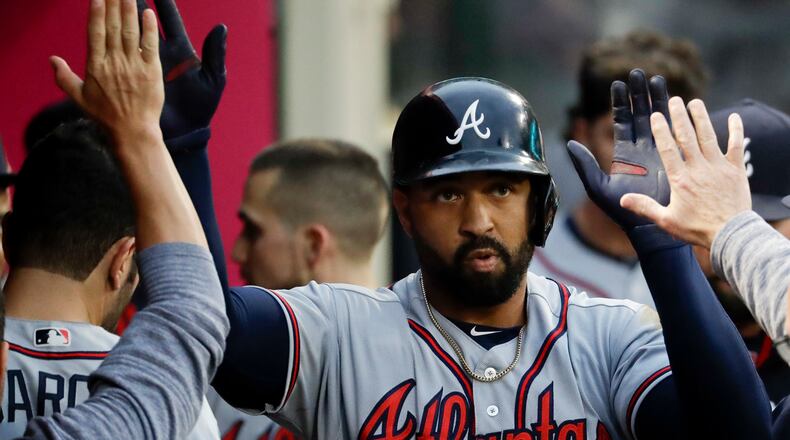Having surprised us so often in their personnel moves, the Atlanta Braves have lost the ability to shock. We know they'll trade (almost) anybody, which means we can (almost) never say never. But here's one trade that would stump this band:
Shedding Matt Kemp.
The estimable Bob Nightengale of USA Today listed Kemp among 25 MLB players who could soon be moving. (For the record, Kemp was No. 22 in terms of probability.) I'm not sure I'd put him among the 20 most likely Braves to dealt.
Yes, he's 32. Yes, they're rebuilding. Yes, they're paying him $19 million of the $21.75 he's owed annually, which makes him their second-biggest outlay, Freddie Freeman being the biggest, and Kemp's contract has 2 2/3 years to run. So yes, Kemp fits the profile of the sort of player the Braves have dumped.
Here's the difference: Kemp has been really good, and the Braves really like him.
He's fourth in the majors in batting (.345), ninth in slugging percentage and 12th in OPS. He's also 12th in FanGraphs' wRC+ (weighted runs created, as adjusted for ballparks) at 160 , which isn't far from the 168 he mustered in 2011, when he finished second to Ryan Braun in the MVP voting.
One of the few baseball things that defy even advanced analytics is the value of lineup construction. We cannot know for certain what numbers Freeman would have posted had, say, Dansby Swanson been batting one spot after him. We can know this: Freeman's rise from good hitter to great dovetailed with the arrival of Kemp. "I haven't had a guy like that hitting behind me since Justin Upton," Freeman has said.
We can go even further. The Braves were a terrible offensive team for two-thirds of last season. Once Kemp arrived in August, they started hitting like crazy. It's fair to say that Ender Inciarte's season-ending leadoff tear wasn't directly tied to Kemp batting cleanup, but hitting can be contagious. (So can not hitting.)
The Braves haven't scored as much this season (23rd in the majors in runs) as they did at the shank of last year (sixth-best after the All-Star break), but we always wondered whether that was a blip. And they are eighth in the majors in batting average and seventh in on-base percentage, which means they're no longer an offensive embarrassment.
Back to Kemp: WAR is a measure that hasn't lately been kind to him. (For one thing, he doesn't walk much, and WAR is big on OBP. For another, he's not a plus baserunner. For yet another, he's a minus defender.) Last year Kemp hit 35 homers and drove in 108 runs and managed an 0.7 FanGraphs WAR. This year he's at 1.3, which puts him on pace for 4.1, which wouldn't just be his best since 2011 (8.3) -- it would almost double his previous four seasons combined (2.1).
Kemp was considered damaged goods. He'd declined precipitously as a Dodger and done next to nothing as a Padre. The Braves knew that. They also knew that they wanted to rid themselves of Hector Olivera's contract and that, apart from Freeman, they had precious few power hitters under contract. They took a chance. They like what they've gotten.
Nightengale suggests the Braves would have to assume much of Kemp's salary to make him trade-able, and that's not something they'd be eager to do with anyone who has value. Kemp has value. He has had a positive effect on their major-league product and, it would seem, on Freeman, their greatest asset. It would take a Swanson/Inciarte/Blair package to pry Kemp away, and nobody's apt to make such a deal for a 32-year-old left fielder.
Put simply, Kemp has come to mean more to the Braves than he's apt to mean to anyone else. There are only three big-league Braves that we can call definite keepers -- Freeman, Inciarte and Swanson; Julio Teheran might have slipped from definite to probable -- but Kemp, who was traded twice in 19 1/2 months, has come close to rendering himself indispensable here.
About the Author
The Latest
Featured


